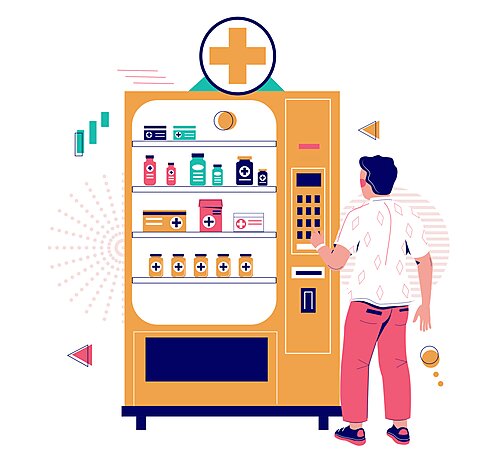Jeffrey A. Singer
Over the past several years, different jurisdictions in the US, Canada, and Europe have allowed people who use illicit drugs to access harm reduction equipment through vending machines.
In 1987, Denmark became the first country to permit harm reduction organizations to operate vending machines. Since then, harm reduction vending machines have spread across Europe, including in Austria, France, Germany, Italy, the Netherlands, and Switzerland, as well as in Australia, Canada, and New Zealand. Germany, with about 160 vending machines, leads the world in the number of machines dispensing syringes and other paraphernalia.
Many vending machines in Canada provide clean pipes, condoms, and HIV testing kits along with naloxone. In 2020, the British Columbian government authorized vending machines, called MySafe, to dispense a “safe supply” of legal drugs, such as hydromorphone (Dilaudid), to people who use illicit drugs, aiming to reduce the risks of uncertain dosages and unreliable black-market products. Writing in the Canadian Medical Association Journal, researchers at the University of Waterloo described the program:
Medications for MySafe participants are dispensed at a local pharmacy, and the prescribed doses (as packaged, daily doses of tablets) are manually inserted into the machine. The machine (scans a participant’s handprint and then dispenses their daily prescription (e.g., 1 package of 16 hydromorphone tablets). Participants are expected to take their medications daily. Participants undergo a medical evaluation before enrolment and agree to regular follow-ups (at 1, 6 and 12 months) with a health professional to monitor health outcomes and conduct urine drug screens at the discretion of MySafe staff (e.g., with dose increases, to assess medication use). The initial dose is determined by the prescribing physician, along with participants, and titrated to a suitable dose based on an individual’s need. Dose adjustments normally occur during the first month of enrolment; however, dosing changes can be requested at any point.
In February of this year, the British Columbia health minister changed the program to require participants to use safer drugs under clinic supervision instead of taking them home, after reports indicated that many patients were selling these drugs on the street. One could argue that their customers were indirectly benefiting from the safe supply project, albeit secondhand.
While Canada has gone further with “safe supply” dispensing, many US jurisdictions have embraced vending machines for distributing harm reduction tools like naloxone and fentanyl test strips. For example, lawmakers in Clark County, NV, allowed harm reduction organizations to set up and operate vending machines in 2013. Trac‑B, a harm reduction group, started stocking vending machines with the overdose antidote naloxone and clean syringes in 2017. Some vending machines, such as one at the Milwaukee Veterans Affairs hospital cafeteria, offer fentanyl test strips and naloxone but do not provide clean syringes, pipes, or HIV testing kits.
While equipment vending machines differ by jurisdiction, they all operate based on the harm reduction principle of non-judgmentalism, offering anonymity to individuals and helping them avoid stigma, thereby removing barriers to access.
Last month, researchers from Penn State University published a systematic review on the effectiveness of vending machines as a harm reduction strategy in the Harm Reduction Journal. Using the Cochrane, Embase, MEDLINE, and PubMed databases, they examined thirty years of research literature, from the start of vending machines through November 2023. Studies consistently show strong demand for vending machines in various settings such as universities, medical centers, correctional facilities, and commercial sex workplaces. Users value the convenience, increased privacy, and the ability to access supplies at any time. Not only do people who use drugs utilize the vending machines, but they are also generally well-accepted by the surrounding communities.
Two studies in the US found that county-level fatal overdose rates decreased because of naloxone-dispensing vending machines. Several studies found needle-sharing decreased, and some studies suggest the vending machines have led to earlier diagnoses of HIV.
The authors concluded:
Over the past three decades, harm reduction-focused VMs have been used in a variety of settings to offer needed harm reduction items and services, ranging from syringes to HIV self-tests to condoms. There are many potential intrinsic advantages to using VMs as a low-barrier method to reach high-risk, hard-to-reach individuals, reduce the harms associated with SUD and address co-occurring conditions. This systematic review indicates high feasibility and acceptability of these VMs among their target populations. Harm reduction-focused VMs continue to grow in popularity, particularly in the U.S., and have evolved to reflect changing harm reduction needs (e.g., VMs are now dispensing naloxone and drug testing kits). Long-term impact evaluation of the VMs, and implementation science frameworks are needed in future VM-related research to rigorously evaluate the VMs and help ensure their effective implementation and sustainability within the community.
Lawmakers must set aside outdated biases and adopt harm reduction tools that are effective. Vending machines are innovative, life-saving interventions—and we need more of them.

